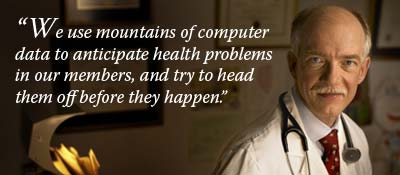
To an untrained eye, the millions of medical forms and reports that come through our computer network each year amount to a massive tangle of data.
But to Dr. David Brumley, Medical Director of Disease Management programs at Blue Cross Blue Shield of Massachusetts, the data is rich with important information he and a team of associates use to improve the health of our members. Dr. Brumley and this group sift through information provided by the data to identify problems before they occur; to prevent illness and disease.
"We use the data to identify problems our members might be having now and to try and head off problems in the future, says Dr. Brumley. We scan the data to identify risk factors. For example, we might find a person with diabetes and then we help that person do a series of things that improve their condition."
"When we find a member who could benefit, one of our clinical staff will call and invite that member to join a program we have in place to help him manage and control his diabetes. We'll provide a whole host of information and education intended to help the person not only take steps to improve his health but hopefully head off more serious problems from developing."
"Blue Cross Blue Shield of Massachusetts has a vast amount of diagnostic, claims, pharmacy, and clinical data. What's so exciting is that we now have the capability of using it to actually improve peoples' health."
"The nurses and coaches in the programs are able to provide education and guidance that helps reinforce a doctor's treatment plan for a patient. We try and promote the lifestyle changes doctors want their patients to adopt. And when we identify critical clinical issues we notify the patient's physician and help coordinate services."
"We have new predictive modeling capabilities that enable us to flag problems our members are having. And then we have disease management specialists who work with patients and physicians to help coordinate care and improve clinical outcomes--and, often times, achieve cost savings for our members."
"We look at all of our members in an effort to improve access to the right clinical services, improve their quality of life and keep costs to a minimum. We achieve this through case management, disease management and prevention and wellness programs."
"With case management we may take someone who's been in the hospital and make sure that after they get out they get the services they need and that everything possible is being done to speed them back to full recovery."
"With disease management we look at a population through our data. For example, we identify members with coronary artery disease and invite them to join a program where we educate them and work with them to lose weight, quit smoking and follow their doctor's treatment plan."
"One of the things we've done is to create a clinical algorithm which enables us to identify all of our members with coronary disease and those with significant risk. We want to look at the most vulnerable cases first, of course, to see whether they need help in following their physician's advice or with lifestyle changes that can reduce their risk of a subsequent heart attack."
"Once identified, we'll send them a letter explaining that we have identified some ways we think we can be helpful. We tell them that one of our nurses or coaches will be calling them to invite them to join in one of our programs. Most people we call react very positively. They're really pleased that we've called, and often surprised that an insurance company is in the business of actively intervening to try and improve their health."






